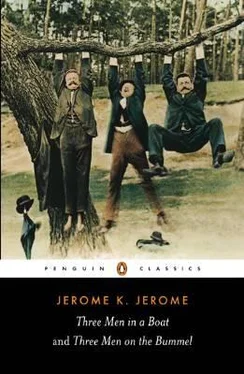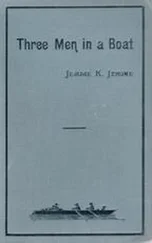Jerome Jerome - Three Men on the Bummel
Здесь есть возможность читать онлайн «Jerome Jerome - Three Men on the Bummel» весь текст электронной книги совершенно бесплатно (целиком полную версию без сокращений). В некоторых случаях можно слушать аудио, скачать через торрент в формате fb2 и присутствует краткое содержание. Жанр: Юмористическая проза, на английском языке. Описание произведения, (предисловие) а так же отзывы посетителей доступны на портале библиотеки ЛибКат.
- Название:Three Men on the Bummel
- Автор:
- Жанр:
- Год:неизвестен
- ISBN:нет данных
- Рейтинг книги:4 / 5. Голосов: 1
-
Избранное:Добавить в избранное
- Отзывы:
-
Ваша оценка:
- 80
- 1
- 2
- 3
- 4
- 5
Three Men on the Bummel: краткое содержание, описание и аннотация
Предлагаем к чтению аннотацию, описание, краткое содержание или предисловие (зависит от того, что написал сам автор книги «Three Men on the Bummel»). Если вы не нашли необходимую информацию о книге — напишите в комментариях, мы постараемся отыскать её.
Three Men on the Bummel — читать онлайн бесплатно полную книгу (весь текст) целиком
Ниже представлен текст книги, разбитый по страницам. Система сохранения места последней прочитанной страницы, позволяет с удобством читать онлайн бесплатно книгу «Three Men on the Bummel», без необходимости каждый раз заново искать на чём Вы остановились. Поставьте закладку, и сможете в любой момент перейти на страницу, на которой закончили чтение.
Интервал:
Закладка:
At Waldshut, one of those little sixteenth-century towns through which the Rhine flows during its earlier course, we came across that exceedingly common object of the Continent: the travelling Briton grieved and surprised at the unacquaintance of the foreigner with the subtleties of the English language. When we entered the station he was, in very fair English, though with a slight Somersetshire accent, explaining to a porter for the tenth time, as he informed us, the simple fact that though he himself had a ticket for Donaueschingen, and wanted to go to Donaueschingen, to see the source of the Danube, which is not there, though they tell you it is, he wished his bicycle to be sent on to Engen and his bag to Constance, there to await his arrival. He was hot and angry with the effort of the thing. The porter was a young man in years, but at the moment looked old and miserable. I offered my services. I wish now I had not-though not so fervently, I expect, as he, the speechless one, came subsequently to wish this. All three routes, so the porter explained to us, were complicated, necessitating changing and re-changing. There was not much time for calm elucidation, as our own train was starting in a few minutes. The man himself was voluble-always a mistake when anything entangled has to be made clear; while the porter was only too eager to get the job done with and so breathe again. It dawned upon me ten minutes later, when thinking the matter over in the train, that though I had agreed with the porter that it would be best for the bicycle to go by way of Immendingen, and had agreed to his booking it to Immendingen, I had neglected to give instructions for its departure from Immendingen. Were I of a despondent temperament I should be worrying myself at the present moment with the reflection that in all probability that bicycle is still at Immendingen to this day. But I regard it as good philosophy to endeavour always to see the brighter side of things. Possibly the porter corrected my omission on his own account, or some simple miracle may have happened to restore that bicycle to its owner some time before the end of his tour. The bag we sent to Radolfzell: but here I console myself with the recollection that it was labelled Constance; and no doubt after a while the railway authorities, finding it unclaimed at Radolfzell, forwarded it on to Constance.
But all this is apart from the moral I wished to draw from the incident. The true inwardness of the situation lay in the indignation of this Britisher at finding a German railway porter unable to comprehend English. The moment we spoke to him he expressed this indignation in no measured terms.
"Thank you very much indeed," he said; "it's simple enough. I want to go to Donaueschingen myself by train; from Donaueschingen I am going to walk to Geisengen; from Geisengen I am going to take the train to Engen, and from Engen I am going to bicycle to Constance. But I don't want to take my bag with me; I want to find it at Constance when I get there. I have been trying to explain the thing to this fool for the last ten minutes; but I can't get it into him."
"It is very disgraceful," I agreed. "Some of these German workmen know hardly any other language than their own."
"I have gone over it with him," continued the man, "on the time table, and explained it by pantomime. Even then I could not knock it into him."
"I can hardly believe you," I again remarked; "you would think the thing explained itself."
Harris was angry with the man; he wished to reprove him for his folly in journeying through the outlying portions of a foreign clime, and seeking in such to accomplish complicated railway tricks without knowing a word of the language of the country. But I checked the impulsiveness of Harris, and pointed out to him the great and good work at which the man was unconsciously assisting.
Shakespeare and Milton may have done their little best to spread acquaintance with the English tongue among the less favoured inhabitants of Europe. Newton and Darwin may have rendered their language a necessity among educated and thoughtful foreigners. Dickens and Ouida (for your folk who imagine that the literary world is bounded by the prejudices of New Grub Street, would be surprised and grieved at the position occupied abroad by this at— home-sneered-at lady) may have helped still further to popularise it. But the man who has spread the knowledge of English from Cape St. Vincent to the Ural Mountains is the Englishman who, unable or unwilling to learn a single word of any language but his own, travels purse in hand into every corner of the Continent. One may be shocked at his ignorance, annoyed at his stupidity, angry at his presumption. But the practical fact remains; he it is that is anglicising Europe. For him the Swiss peasant tramps through the snow on winter evenings to attend the English class open in every village. For him the coachman and the guard, the chambermaid and the laundress, pore over their English grammars and colloquial phrase books. For him the foreign shopkeeper and merchant send their sons and daughters in their thousands to study in every English town. For him it is that every foreign hotel— and restaurant-keeper adds to his advertisement: "Only those with fair knowledge of English need apply."
Did the English-speaking races make it their rule to speak anything else than English, the marvellous progress of the English tongue throughout the world would stop. The English-speaking man stands amid the strangers and jingles his gold.
"Here," cries, "is payment for all such as can speak English."
He it is who is the great educator. Theoretically we may scold him; practically we should take our hats off to him. He is the missionary of the English tongue.
Chapter XII
We are grieved at the earthly instincts of the German-A superb view, but no restaurant-Continental opinion of the Englishman— That he does not know enough to come in out of the rain-There comes a weary traveller with a brick-The hurting of the dog-An undesirable family residence-A fruitful region-A merry old soul comes up the hill-George, alarmed at the lateness of the hour, hastens down the other side-Harris follows him, to show him the way-I hate being alone, and follow Harris-Pronunciation specially designed for use of foreigners.
A thing that vexes much the high-class Anglo-Saxon soul is the earthly instinct prompting the German to fix a restaurant at the goal of every excursion. On mountain summit, in fairy glen, on lonely pass, by waterfall or winding stream, stands ever the busy Wirtschaft. How can one rhapsodise over a view when surrounded by beer-stained tables? How lose one's self in historical reverie amid the odour of roast veal and spinach?
One day, on elevating thoughts intent, we climbed through tangled woods.
"And at the top," said Harris, bitterly, as we paused to breathe a space and pull our belts a hole tighter, "there will be a gaudy restaurant, where people will be guzzling beefsteaks and plum tarts and drinking white wine."
"Do you think so?" said George.
"Sure to be," answered Harris; "you know their way. Not one grove will they consent to dedicate to solitude and contemplation; not one height will they leave to the lover of nature unpolluted by the gross and the material."
"I calculate," I remarked, "that we shall be there a little before one o'clock, provided we don't dawdle."
"The 'mittagstisch' will be just ready," groaned Harris, "with possibly some of those little blue trout they catch about here. In Germany one never seems able to get away from food and drink. It is maddening!"
We pushed on, and in the beauty of the walk forgot our indignation. My estimate proved to be correct.
At a quarter to one, said Harris, who was leading:
"Here we are; I can see the summit."
Читать дальшеИнтервал:
Закладка:
Похожие книги на «Three Men on the Bummel»
Представляем Вашему вниманию похожие книги на «Three Men on the Bummel» списком для выбора. Мы отобрали схожую по названию и смыслу литературу в надежде предоставить читателям больше вариантов отыскать новые, интересные, ещё непрочитанные произведения.
Обсуждение, отзывы о книге «Three Men on the Bummel» и просто собственные мнения читателей. Оставьте ваши комментарии, напишите, что Вы думаете о произведении, его смысле или главных героях. Укажите что конкретно понравилось, а что нет, и почему Вы так считаете.










